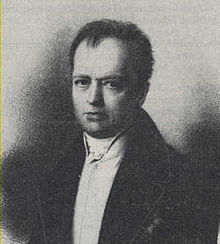Christian Wilhelm Schweitzer
Christian Wilhelm Schweitzer (born November 1, 1781 in Naumburg (Saale) , † October 26, 1856 in Clodra ) was a German lawyer and politician . From 1843 he was Minister of State in the Grand Duchy of Saxony-Weimar-Eisenach .
Life
Schweitzer was born in 1781 in Naumburg an der Saale, Saxony, as the son of the local merchant Christian Schweitzer and Frenkel, born Christina Dorothea. He was taught by private tutors, but later complained that he had only realized at university how incomplete his knowledge was. He studied law at the University of Leipzig from 1799 to 1802 and received his doctorate there, only 22 years old, in 1803. Schweitzer completed his habilitation at the Wittenberg University and dealt intensively with legal history and bill of exchange law , but settled as a lawyer in Ronneburg three years later . In 1808 he married Auguste Charlotte Heubner, daughter of the Grand Ducal Council in Ronneburg Christian Heubner. In 1810 he became professor of law at the University of Jena . His son Lorenz Wilhelm was born on October 9, 1811.
In 1814 and 1815 he was instrumental in building the Weimar Landsturm and was himself field colonel of III. Jena banners. In 1815 he worked in the German central administration department in Frankfurt am Main , an institution of Baron von Stein , as a representative of the University of Jena. Schweitzer's most important achievement was the drafting of the constitution for the Grand Duchy of Saxony-Weimar-Eisenach. The legal expert was actively involved in drafting the Basic Law as an employee. The Grand Duchy was one of the first states of the German Confederation to implement the constitutional promise made there in accordance with Article XIII of the German Federal Act . The constitution was promulgated in 1816 and caused a sensation all over Germany. Schweitzer was also the author of numerous legal articles and specialist literature, which received a lot of attention. In 1817 he was elected to the new state parliament of Saxony-Weimar-Eisenach for the University of Jena, where he was named “1. Assistant ”(Vice President) appointed.
Christian Wilhelm Schweitzer is one of the so-called political professors at the University of Jena, alongside Heinrich Luden , Lorenz Oken , Jakob Friedrich Fries and Dietrich Georg von Kieser . Together with Fries, Kieser and Oken he took part in the Wartburg Festival in 1817 and was deeply impressed by the patriotic zeal. However, his participation was rather coincidental as he was on a business trip. During the campaign against Weimar politics, the University of Jena and the trial against Fries, which began primarily with the Prussian chief director of the police ministry Karl Albert von Kamptz , as a member of the Jena Higher Appeal Court , he tried to repel the attacks. In the simultaneous dispute between the Weimar state and its state university in Jena, however, in contrast to Oken, he swung to the side of the state.
Thereupon Grand Duke Karl August appointed him to the civil service in 1818 and appointed Schweitzer to the Privy Council of State with a seat and vote in the State Ministry. In 1827 he became chairman of the Immediatkommission for education and instruction and in 1828 real secret council with the title of excellence . After Goethe's death in 1832, Schweitzer was his successor in the Weimar supervisory authority over the immediate institutions for art and science and later retained as head of the III. Departments of the Weimar State Ministry are responsible for church and school affairs in the Grand Duchy. He supported small-state politics and welcomed the Weimar state's participation in the Central German Trade Association . Appointed Minister of State in 1843, he was increasingly conservative. Among other things, he strictly rejected a restriction on princely expenses and the demand for public parliamentary sessions.
After the March Revolution of 1848 , the liberal opposition demanded the resignation of the main representatives of the old order. On March 11, Schweitzer was released from civil service. On February 2, 1848, he had already submitted a request for dismissal, but it was rejected. Schweitzer withdrew to his estates in Clodra near Berga / Elster. There he celebrated his 50th anniversary as a doctor in 1853, honored by the princely family and former colleagues. Christian Wilhelm Schweitzer died three years later at the age of 74 in Clodra.
Works
- Command over the provocation process. according to Saxon law. (1807)
- Text-book of the Saxon bourgeois process. (1813)
- About legal practice colleges. (1817)
- Public law of the Großh. S. Weimar-Eisenach. (1825)
literature
- Klaus Ries : Word and deed: the political professorships at the University of Jena in the early 19th century. Steiner, Stuttgart 2007; ISBN 3-515-08993-4 .
- Author collective: Biographical lexicon on German history. German Science Publishers, Berlin 1971.
- Ernst Wülcker : Schweitzer, Christian Wilhelm . In: Allgemeine Deutsche Biographie (ADB). Volume 33, Duncker & Humblot, Leipzig 1891, pp. 367-370.
Web links
- Literature by and about Christian Wilhelm Schweitzer in the catalog of the German National Library
- Entry on Christian Wilhelm Schweitzer in Kalliope
- Works by and about Christian Wilhelm Schweitzer in the German Digital Library
- Entry on Christian Wilhelm Schweitzer in the central database of bequests
| personal data | |
|---|---|
| SURNAME | Schweitzer, Christian Wilhelm |
| BRIEF DESCRIPTION | German lawyer and politician |
| DATE OF BIRTH | November 1, 1781 |
| PLACE OF BIRTH | Naumburg |
| DATE OF DEATH | October 26, 1856 |
| Place of death | Clodra |
